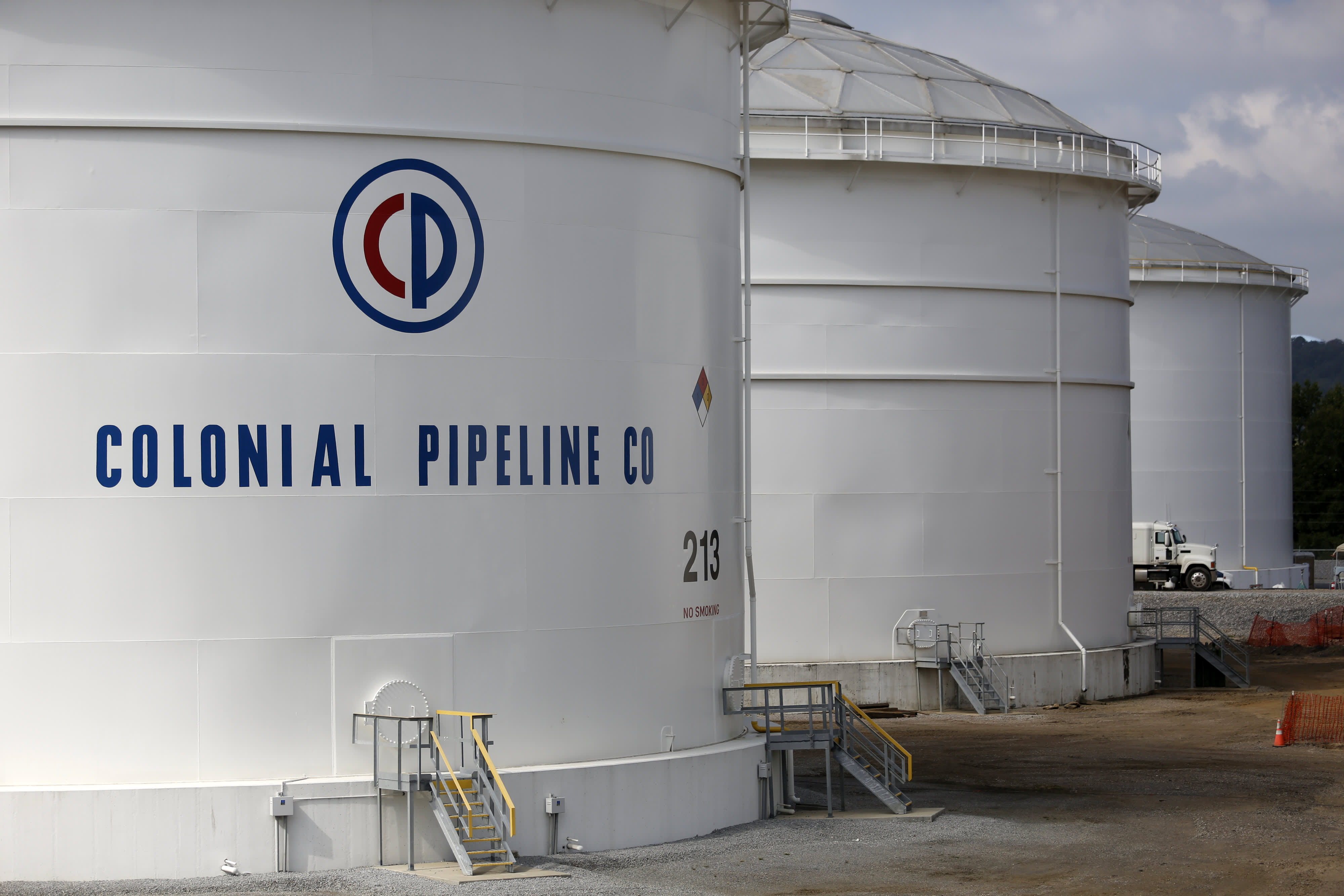
The United States' largest fuel pipeline has been mostly shut since Friday after a cybersecurity attack — and it's not clear how long the outage will last.
Wells Fargo says the restart date is key, and outlined three possible scenarios for reopening that could help investors gauge the possible impact.
The operator of Colonial Pipeline fell prey to a ransomware attack on Friday, forcing all pipeline operations to stop. Colonial Pipeline said Sunday it is developing a system restart plan, and that some smaller lines are now operational.
The company said it will "bring our full system back online only when we believe it is safe to do so, and in full compliance with the approval of all federal regulations."
3 possible scenarios
"Timing of the restart is the critical issue," said analyst Roger Read in a note on Sunday. He outlined three possible date ranges:
1. Fewer than five days: If a partial restart of the pipeline begins by Wednesday, there will be "no significant or lasting impacts."
2. Six to 10 days: Refiners may need to reduce the amount of crude oil they process if the pipeline remains shut for up to 10 days. Inventories will rise in the U.S. Gulf Coast, causing prices to fall, while prices in the East Coast would jump, the analyst said. The East Coast is also likely to import more waterborne fuel, and spot shortages will start to take place in parts of the Southeast of the U.S.
3. More than 10 days: Refiners in the Gulf Coast will almost definitely have to reduce their runs, and oil prices may weaken compared to waterborne crudes to encourage exports. "Expect significant fuel shortages in the interior Southeast of the U.S.," Wells Fargo said in the note.
Why it matters
Colonial operates the country's largest refined products pipeline and transports 2.5 million barrels per day, according to its website. It connects refineries from the U.S. Gulf Coast to more than 50 million people in southern and eastern U.S.
The pipeline transports gas, diesel, home heating oil and jet fuel.
Which scenario is likely?
Patrick De Haan, head of petroleum analysis at GasBuddy, said there hasn't been much information on when the pipeline could come back online.
"There's really been no news," he told CNBC's "Street Signs Asia" on Monday.
"Even well-placed sources I've talked to really have nothing to say, and so the market really has no idea if this could be online tomorrow, if it's going to be three days," he said.
That may be why the market has responded "very cautiously."
Gasoline futures were up 1.28% to $2.1542 per gallon, while heating oil futures rose 0.73% to $2.0252.
West Texas Intermediate crude futures, the U.S. oil benchmark, advanced 31 cents to $65.21 per barrel. International benchmark Brent crude traded at $68.65 per barrel, gaining 37 cents. Natural gas futures were down 0.74% at $2.936 per million British thermal units.
"It's hard to know if Colonial or the authorities in this issue even have a feeling for when this could be resolved themselves," De Haan said. "I think you're seeing the market respond very cautiously, not knowing if this could extend into five, seven, 10, 14 days."
What can be done?
Barges may be a "good alternative" way to transport refined products to other parts of the U.S., said De Haan. However, the government would need to waive the Jones Act, which requires trade between U.S. ports to be carried on ships that are built, owned and operated by U.S. citizens or permanent residents.
"I would think that that could happen relatively soon, but again that may offer detail on where the situation is going," he said. "Perhaps the federal government doesn't yet think that that is necessary."
Analysts from RBC Capital Markets said in a note that the East Coast could draw down inventories, rely on other districts, or increase gasoline imports — but these options would lead to higher energy prices.
As the outage continues, the situation could become more severe as time is running out, De Haan said.
"In the day or two ahead, we could start to see products running low or completely out in some of these affected regions," he said.
— CNBC's Emma Newburger contributed to this report.
https://ift.tt/3eZOT6A
Business
Bagikan Berita Ini















0 Response to "A major U.S. pipeline is still mostly shut due to a cyberattack. Here's what you need to know - CNBC"
Post a Comment